人教部编版初中英语中考78个易混易错单词短语句型梳理
- 格式:doc
- 大小:65.50 KB
- 文档页数:17
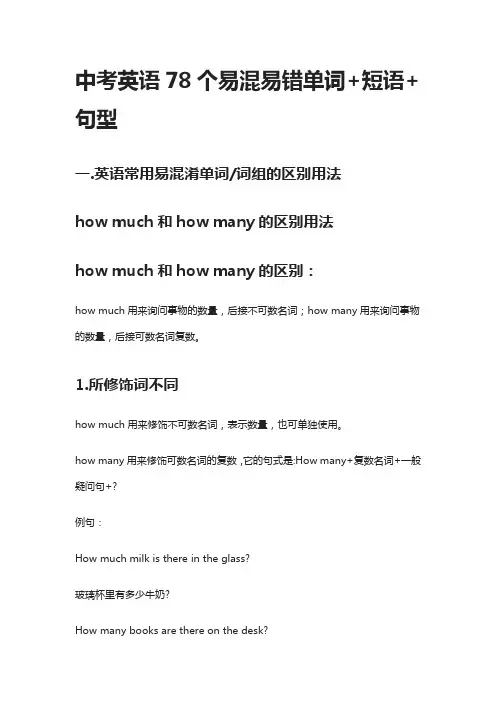
中考英语78个易混易错单词+短语+句型一.英语常用易混淆单词/词组的区别用法how much和how many的区别用法how much和how many的区别:how much用来询问事物的数量,后接不可数名词;how many用来询问事物的数量,后接可数名词复数。
1.所修饰词不同how much用来修饰不可数名词,表示数量,也可单独使用。
how many用来修饰可数名词的复数,它的句式是:How many+复数名词+一般疑问句+?例句:How much milk is there in the glass?玻璃杯里有多少牛奶?How many books are there on the desk?有多少本书在桌子上?2.用法不同How much 表示多少钱,用来问价格。
例句:How much is this dress?这个连衣裙多少钱?How many 表示多少,用来问数量。
例句:How many apples do you have?你有多少苹果?in和on的区别用法:当我们表示某些东西被其他东西所包围时使用“in”这个词。
而“on”用于描述物体被放置在其他物体上方或外部的情况。
in可表时间,表地点,表手段、方法、材料。
on表示时间、地点、方位等。
1.意思不同in:prep.在 ... 里;在 ... 地方;在 ... 期间on:prep.在 ... 之上2.用法不同in:in着重一段时间的过程,常用于重复动作或延续动作。
in表示从现在时间算起推移到将来的一段时间之后,一般与将来时态连用。
He is a layman in economics.他对经济学一窍不通。
on:表示“在物体的表面上”,只能用on的表达方式有on the next morning,on the following。
The spider is walking on the ceiling.蜘蛛在天花板上爬行。
3.侧重点不同in:表示“在其中”。
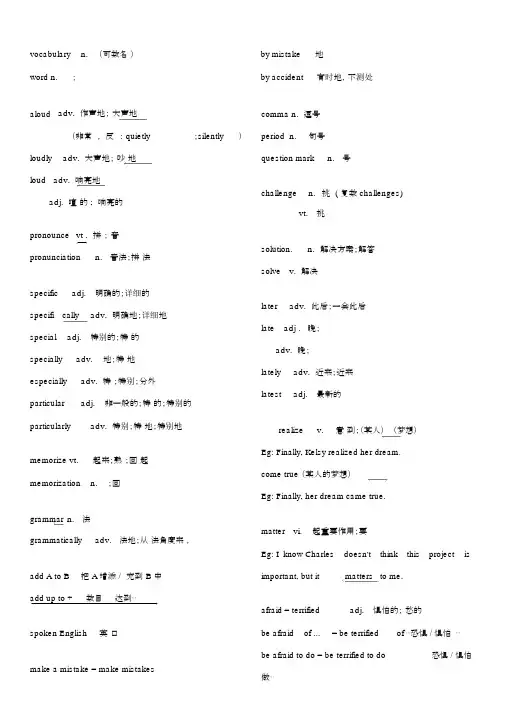
vocabulary n. (可数名)by mistake地word n.;by accident有时地,不测处aloud adv. 作声地;大声地comma n.逗号(非常,反: quietly;silently)period n.句号loudly adv. 大声地;吵地question mark n. 号loud adv. 响亮地adj. 喧的;响亮的challenge n.挑 ( 复数 challenges)vt.挑pronounce vt . 拼;音pronunciation n. 音法;拼法specific adj.明确的;详细的specifi cally adv. 明确地;详细地special adj.特别的;特的specially adv. 地;特地especially adv. 特;特别;分外particular adj.非一般的;特的;特别的particularly adv. 特别;特地;特别地memorize vt.起来;熟;回起memorization n. ;回grammar n. 法grammatically adv. 法地;从法角度来,add A to B把A增添/充到B中add up to +数目达到⋯spoken English英口make a mistake = make mistakes solution.n. 解决方案;解答solve v. 解决later adv. 此后;一会此后late adj .晚;adv. 晚;lately adv. 近来;近来latest adj.最新的realize v.意到;(某人)(梦想)Eg: Finally, Kelsy realized her dream.come true (某人的梦想)Eg: Finally, her dream came true.matter vi.起重要作用;要Eg: I know Charles doesn't think this project is important, but it matters to me.afraid = terrified adj.惧怕的;愁的be afraid of ... = be terrified of ⋯恐惧 / 惧怕⋯be afraid to do = be terrified to do恐惧/惧怕做⋯laugh at⋯= make fun of⋯讥笑/嘲讽⋯complete vt.达成adj.完好的;完好的completely adv 完好地childhood n. 童年on duty班;日break off忽然中断;中断break down抛;出缺点break up分手take a ride兜take care小心,注意;珍重sb.be sure of sth.sb. be sure to do sth.sb. Be sure that⋯it is certain(无疑;确立) thatcertain adj.某,某些,某个Eg:friendly的比是friendlier,最高是friendliestcomic n.漫画,画志patient adj.耐心的n.病人patiently adv. 耐心地at the end of⋯in the endtake pride in⋯= be proud of⋯with pleasure能够用来答方的求,Eg: “Would you mind holding the door open forme, please ” “Oh, with pleasure.”It ’ s a pleasure.或It’s my pleasure.是用往返答感的答。
![[全]人教版七八九年级英语常考易混短语](https://uimg.taocdn.com/768d12910722192e4436f654.webp)
人教版七八九年级英语常考易混短语一.make的短语1. make friends 结交朋友2. make a wish 许愿3. make (one’s)bed 铺床4. Make up 编造故事,编造谎言5. Make sure 确保,查明6.Make promises 许诺7.Make (a lot of ) money 赚许多钱8.Make mistakes 犯错误9.Make a difference 影响,起作用10.make one’s way 前进;费力地前进11.make one’s own decision 自己做决定12.make an effort 做出努力13.make......feel at home 使某人感到宾至如归14.make a mess 弄得一团糟(一塌糊涂)二.take1. take a shower 洗淋浴2.take a walk 散步;走一走3.take the train/bus 乘火车/公共汽车4.take a message 捎个口信,传话5.take a photo of 给。
照相6. take one’s order 点菜7.Take ......seriously 认真对待8.Take sb’s place 代替,替换9.Take up (尤指为消遣)学着做,开始做10.Take out 拿出,带出11.Take a trip 去旅行12.Take one’s temperature 量体温13.Take breaks (take a break) 休息14.Take risks(take a risk) 冒险15.Take after (外貌或行为)像16.take out the rubbish 倒垃圾17.Take care of 照顾,处理18.take in 吸入,吞入(体内)19.take down 拆除,往下拽,记录20.take notes 记笔记21.take pride in 为。
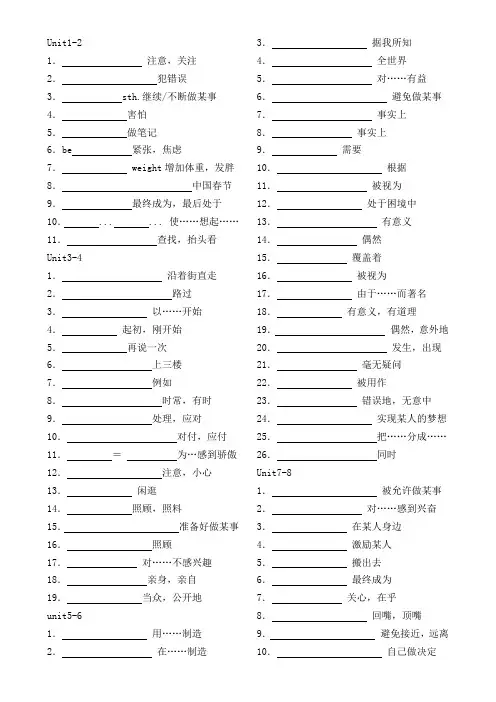
Unit1-21.注意,关注2.犯错误3. sth.继续/不断做某事4.害怕5.做笔记6.be 紧张,焦虑7. weight增加体重,发胖8.中国春节9.最终成为,最后处于10. ... ... 使……想起……11.查找,抬头看Unit3-41.沿着街直走2.路过3.以……开始4.起初,刚开始5.再说一次6.上三楼7.例如8.时常,有时9.处理,应对10.对付,应付11.=为…感到骄傲12.注意,小心13.闲逛14.照顾,照料15.准备好做某事16.照顾17.对……不感兴趣18.亲身,亲自19.当众,公开地unit5-61.用……制造2.在……制造3.据我所知4.全世界5.对……有益6.避免做某事7.事实上8.事实上9.需要10.根据11.被视为12.处于困境中13.有意义14.偶然15.覆盖着16.被视为17.由于……而著名18.有意义,有道理19.偶然,意外地20.发生,出现21.毫无疑问22.被用作23.错误地,无意中24.实现某人的梦想25.把……分成……26.同时Unit7-81.被允许做某事2.对……感到兴奋3.在某人身边4.激励某人5.搬出去6.最终成为7.关心,在乎8.回嘴,顶嘴9.避免接近,远离10.自己做决定11.挡……的路,妨碍12.不但……而且……13.让某事被做14. ______ 拾起,捡起;接人15.起初,首先16.指出17.对…是认真的,认真对待18.和…交流,和…沟通unit9-101.既然那样,假使那样的话2.使……高兴,振奋3.大量,充足4.查阅,向上看5.总共,总计6.在……的末尾7.伸出,坚持8.让某人惊讶的是9.在……的两边10.顺便访问,顺便进入11.大动肝火,气愤12.毕竟,终究13.作出努力14.值得做15.出国16.使(某人)感到宾至如归17.对……感觉良好18.随着……跳舞19.随着……一起唱歌20.坚持,固守21.结婚22. a 偶尔,间或23.握手Unit11-121.在……有共同之处2.想要做某事3.代替4.取代某人的位置5.归还6.走过7.让某人进入8.越……越……9.响铃,爆炸,离开10.冲出去11.排队等候12.前往13.减肥14.在这天结束时15.不包括,不提及;省略16.既不……也不……17.齐心协力,通力合作Unit13-141.变成2.代替,而不是3.有关系,起作用,有影响4.砍掉,割掉5.关灯6.使复活7.上下颠倒,倒转8.弄得一团糟9.沉住气,保持冷静10.信任,信赖11.削减,降低;砍伐12.拆除……13.好好利用某物14.建立15.解决,算出16.在……之前,提前17.出发,动身18.期待做某事。
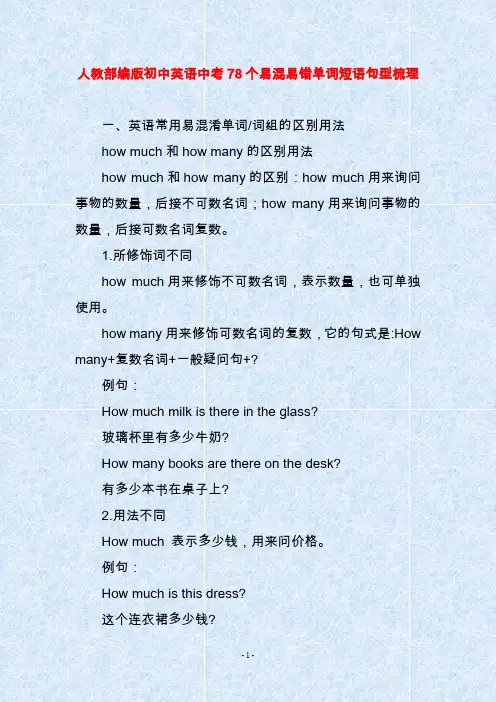
人教部编版初中英语中考78个易混易错单词短语句型梳理一、英语常用易混淆单词/词组的区别用法how much和how many的区别用法how much和how many的区别:how much用来询问事物的数量,后接不可数名词;how many用来询问事物的数量,后接可数名词复数。
1.所修饰词不同how much用来修饰不可数名词,表示数量,也可单独使用。
how many用来修饰可数名词的复数,它的句式是:How many+复数名词+一般疑问句+?例句:How much milk is there in the glass?玻璃杯里有多少牛奶?How many books are there on the desk?有多少本书在桌子上?2.用法不同How much 表示多少钱,用来问价格。
例句:How much is this dress?这个连衣裙多少钱?How many 表示多少,用来问数量。
例句:How many apples do you have?你有多少苹果?in和on的区别用法当我们表示某些东西被其他东西所包围时使用“in”这个词。
而“on”用于描述物体被放置在其他物体上方或外部的情况。
in可表时间,表地点,表手段、方法、材料。
on表示时间、地点、方位等。
1.意思不同in:prep.在 ... 里;在 ... 地方;在 ... 期间on:prep.在 ... 之上2.用法不同in:in着重一段时间的过程,常用于重复动作或延续动作。
in表示从现在时间算起推移到将来的一段时间之后,一般与将来时态连用。
例句:He is a layman in economics.他对经济学一窍不通。
on:表示“在物体的表面上”,只能用on的表达方式有on the next morning,on the following。
例句:The spider is walking on the ceiling.蜘蛛在天花板上爬行。
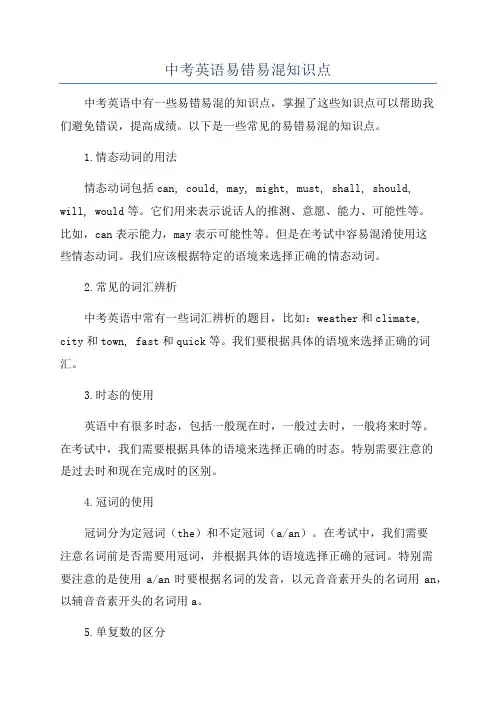
中考英语易错易混知识点中考英语中有一些易错易混的知识点,掌握了这些知识点可以帮助我们避免错误,提高成绩。
以下是一些常见的易错易混的知识点。
1.情态动词的用法情态动词包括can, could, may, might, must, shall, should, will, would等。
它们用来表示说话人的推测、意愿、能力、可能性等。
比如,can表示能力,may表示可能性等。
但是在考试中容易混淆使用这些情态动词。
我们应该根据特定的语境来选择正确的情态动词。
2.常见的词汇辨析中考英语中常有一些词汇辨析的题目,比如:weather和climate, city和town, fast和quick等。
我们要根据具体的语境来选择正确的词汇。
3.时态的使用英语中有很多时态,包括一般现在时,一般过去时,一般将来时等。
在考试中,我们需要根据具体的语境来选择正确的时态。
特别需要注意的是过去时和现在完成时的区别。
4.冠词的使用冠词分为定冠词(the)和不定冠词(a/an)。
在考试中,我们需要注意名词前是否需要用冠词,并根据具体的语境选择正确的冠词。
特别需要注意的是使用a/an时要根据名词的发音,以元音音素开头的名词用an,以辅音音素开头的名词用a。
5.单复数的区分英语中的名词有单数和复数形式。
在考试中,我们需要注意名词是单数还是复数,并根据具体的语境选择正确的形式。
需要特别注意的是一些不规则名词的复数形式。
6.非谓语动词的用法英语的非谓语动词包括不定式、动名词和分词。
在考试中,我们需要根据特定的语境来选择正确的非谓语动词形式。
比如,动名词作主语、宾语或表语,分词作定语或状语等。
7.介词的使用介词在句子中起连接作用。
在考试中,我们需要根据特定的语境来选择正确的介词。
有些介词在含义上非常相近,比如in, on和at,我们需要根据具体的语境来选择正确的介词。
8.连词的使用连词用来连接词、短语、从句等,在考试中我们需要根据特定的语境来选择正确的连词。
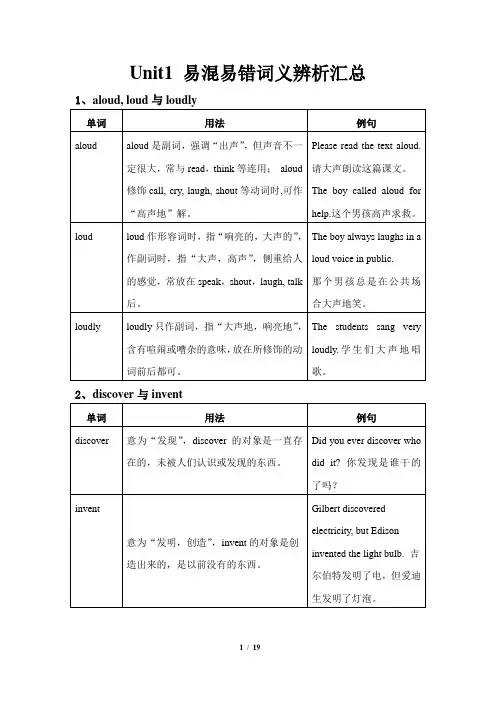
Unit1 易混易错词义辨析汇总1、aloud, loud与loudly2、discover与invent3、by, with, in, through与use4、instead与instead ofUnit2 易错易混词义辨析汇总1、dead, die, death与dying2、like, love与enjoy3、bring, carry, fetch与takeUnit3 易混淆单词和短语辨析1、辨析: beside, besides例:The bookstore is on your right, beside the bank.书店在你的右边,银行旁边。
Besides English, we learn Japanese as well.除了英语,我们还学日语。
2、辨析:between, among例:Between the door and the window there is a map. 门和窗户的中间有一张地图。
He sat among the children. 他坐在孩子们中间。
3、辨析:excuse me, sorry, pardon例:Excuse me, may I use your bicycle, Jack?对不起,我可以用一下你的自行车吗,杰克?I’m sorry. I can’t go to the cinema with you this afternoon.对不起。
我今天下午不能和你一起去看电影。
一Answer the question in English.请用英语回答这个问题。
一Pardon?对不起,请再说一遍。
4、辨析:on one’s way to, in a way, by the way, in the way例:I met an old friend of mine on my way to the station.在去车站的途中,我碰见了我的一位老朋友。
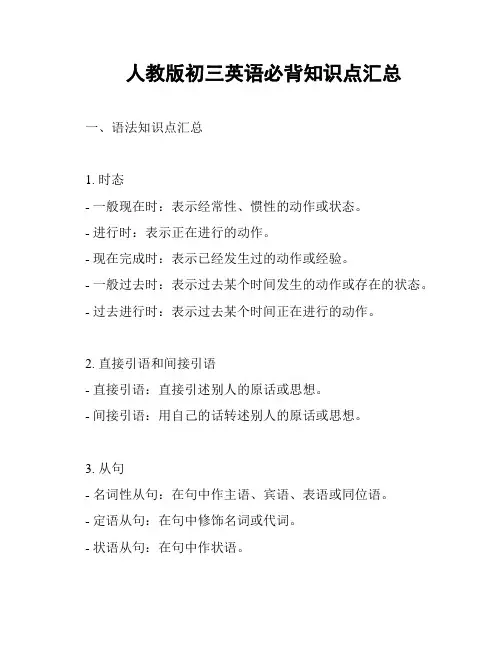
人教版初三英语必背知识点汇总一、语法知识点汇总1. 时态- 一般现在时:表示经常性、惯性的动作或状态。
- 进行时:表示正在进行的动作。
- 现在完成时:表示已经发生过的动作或经验。
- 一般过去时:表示过去某个时间发生的动作或存在的状态。
- 过去进行时:表示过去某个时间正在进行的动作。
2. 直接引语和间接引语- 直接引语:直接引述别人的原话或思想。
- 间接引语:用自己的话转述别人的原话或思想。
3. 从句- 名词性从句:在句中作主语、宾语、表语或同位语。
- 定语从句:在句中修饰名词或代词。
- 状语从句:在句中作状语。
4. 比较级和最高级- 比较级:表示两者在某一方面的比较。
- 最高级:表示三者或三者以上在某一方面的比较。
二、词汇知识点汇总1. 动词短语- look forward to:期待- give up:放弃- make up:编造,弥补- take off:起飞2. 名词短语- in the future:将来- on the one hand:一方面- on the other hand:另一方面- at the same time:同时3. 形容词和副词- curious:好奇的- anxious:焦虑的- fortunately:幸运地- seriously:认真地三、阅读技巧1. 阅读理解技巧- 注意文章标题和开头,获取大意。
- 通读全文,抓住关键信息。
- 注意文章的结构和组织方式。
- 根据问题定位答案。
- 多做练,提高阅读速度和理解能力。
2. 阅读表达技巧- 注意提问方式,审清题意。
- 结合文章内容,概括出要点。
- 注意文章的时态。
- 使用恰当的连接词和过渡词。
四、写作技巧1. 作文结构- 开头:引入话题,引起读者兴趣。
- 主体:运用合适的语言表达观点和论据。
- 结尾:总结全文,给出自己的看法。
2. 语言运用- 注意语法和词汇的正确性。
- 使用恰当的连词和过渡词。
- 适当使用丰富多样的句式。
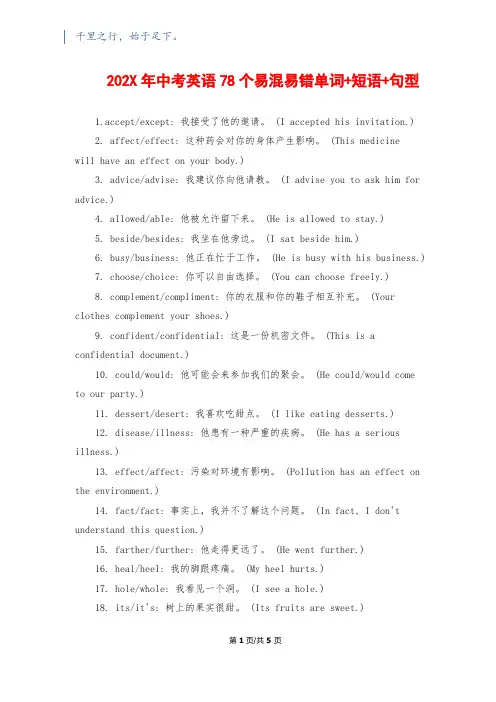
202X年中考英语78个易混易错单词+短语+句型1.accept/except: 我接受了他的邀请。
(I accepted his invitation.)2. affect/effect: 这种药会对你的身体产生影响。
(This medicinewill have an effect on your body.)3. advice/advise: 我建议你向他请教。
(I advise you to ask him for advice.)4. allowed/able: 他被允许留下来。
(He is allowed to stay.)5. beside/besides: 我坐在他旁边。
(I sat beside him.)6. busy/business: 他正在忙于工作。
(He is busy with his business.)7. choose/choice: 你可以自由选择。
(You can choose freely.)8. complement/compliment: 你的衣服和你的鞋子相互补充。
(Your clothes complement your shoes.)9. confident/confidential: 这是一份机密文件。
(This is a confidential document.)10. could/would: 他可能会来参加我们的聚会。
(He could/would cometo our party.)11. dessert/desert: 我喜欢吃甜点。
(I like eating desserts.)12. disease/illness: 他患有一种严重的疾病。
(He has a serious illness.)13. effect/affect: 污染对环境有影响。
(Pollution has an effect on the environment.)14. fact/fact: 事实上,我并不了解这个问题。
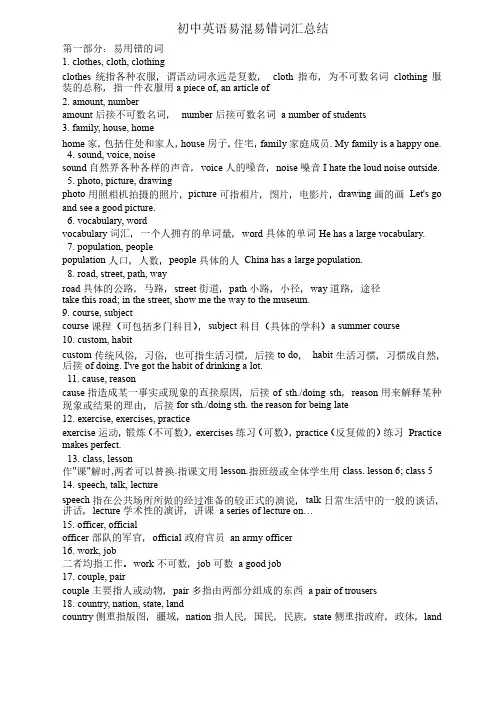
初中英语易混易错词汇总结初中英语易混易错词汇总结第一部分:易用错的词第一部分:易用错的词1. clothes, cloth, clothingclothes 统指各种衣服,谓语动词永远是复数,统指各种衣服,谓语动词永远是复数, cloth 指布,为不可数名词指布,为不可数名词 clothing 服装的总称,指一件衣服用a piece of, an article of 2. amount, numberamount 后接不可数名词,后接不可数名词, number 后接可数名词后接可数名词 a number of students 3. family, house, homehome 家,包括住处和家人,house 房子,住宅,family 家庭成员. My family is a happy one.4. sound, voice, noise sound 自然界各种各样的声音,voice 人的嗓音,noise 噪音I hate the loud noise outside.5. photo, picture, drawing photo 用照相机拍摄的照片,picture 可指相片,图片,电影片,drawing 画的画画的画 Let's go and see a good picture.6. vocabulary, word vocabulary 词汇,一个人拥有的单词量,word 具体的单词He has a large vocabulary.7. population, people population 人口,人数,people 具体的人具体的人 China has a large population.8. road, street, path, way road 具体的公路,马路,street 街道,path 小路,小径,way 道路,途径道路,途径 take this road; in the street, show me the way to the museum. 9. course, subjectcourse 课程(可包括多门科目),subject 科目(具体的学科)a summer course 10. custom, habitcustom 传统风俗,习俗,也可指生活习惯,后接to do , habit 生活习惯,习惯成自然,后接of doing. I've got the habit of drinking a lot.11. cause, reason cause 指造成某一事实或现象的直接原因,后接of sth./doing sth ,reason 用来解释某种现象或结果的理由,后接for sth./doing sth. the reason for being late 12. exercise, exercises, practice exercise 运动,锻炼(不可数),exercises 练习(可数),practice (反复做的)练习练习 Practice makes perfect.13. class, lesson 作"课"解时,两者可以替换.指课文用lesson.指班级或全体学生用class. lesson 6; class 5 14. speech, talk, lecturespeech 指在公共场所所做的经过准备的较正式的演说,talk 日常生活中的一般的谈话,讲话,lecture 学术性的演讲,讲课学术性的演讲,讲课a series of lecture on… 15. officer, officialofficer 部队的军官,official 政府官员政府官员 an army officer 16. work, job二者均指工作。
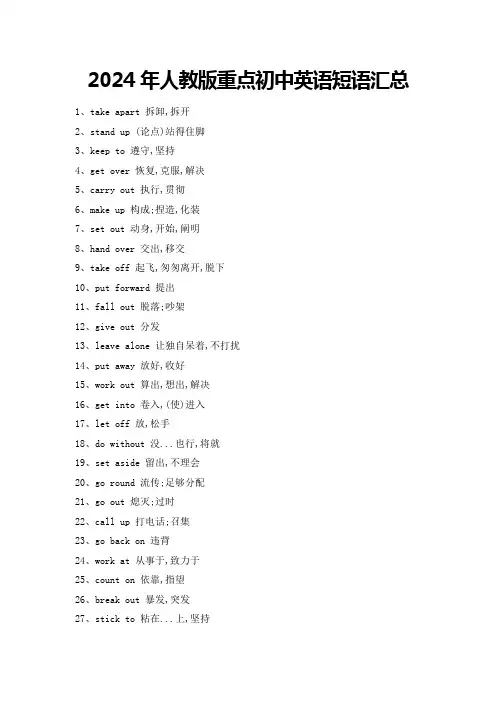
2024年人教版重点初中英语短语汇总1、take apart 拆卸,拆开2、stand up (论点)站得住脚3、keep to 遵守,坚持4、get over 恢复,克服,解决5、carry out 执行,贯彻6、make up 构成;捏造,化装7、set out 动身,开始,阐明8、hand over 交出,移交9、take off 起飞,匆匆离开,脱下10、put forward 提出11、fall out 脱落;吵架12、give out 分发13、leave alone 让独自呆着,不打扰14、put away 放好,收好15、work out 算出,想出,解决16、get into 卷入,(使)进入17、let off 放,松手18、do without 没...也行,将就19、set aside 留出,不理会20、go round 流传;足够分配21、go out 熄灭;过时22、call up 打电话;召集23、go back on 违背24、work at 从事于,致力于25、count on 依靠,指望26、break out 暴发,突发27、stick to 粘在...上,坚持28、wait on 服侍,侍候29、lay down 放下;制定30、come off 举行;成功;脱落31、hurry up (使)赶快,匆匆完成32、put up 建造,张帖,投宿33、give off 释放,放出34、hand in 交上,递交35、deal in 经营36、take to 开始喜欢,开始从事37、die down 变弱,逐渐消失38、ring up 打电话39、sum up 总结,概括40、catch up with 赶上41、fall through 失败,落空42、back down 放弃,让步43、laugh at 因...而笑,嘲笑44、get down 从...下来;写下45、pass on 伟授,传递46、give up 停止,放弃,辞去47、come out 出现;发现;结果是48、turn off 拐 弯,关上49、check in 办理登记手续50、hold out 伸出;坚持;不屈服51、figure out 计算出,想出52、get on with 友好相处;进展53、get in 进入;收获;插话54、fall back on 求助于55、take over 接管,借用56、look into 调查,观察57、get on to 转入;同...联系58、come up against 偶然遇到59、look down upon 看不起,轻视60、go up 上升,增长;被炸毁61、give away 赠送;泄露62、run away with 偷走,大量消耗63、run over 压过去,溢出64、pull off 脱(衣,帽)65、send in 呈递,提交66、break away 突然离开,强行逃脱67、refer to...as 把...称作68、draw on 动用,利用,吸69、come up 出现;走上前来70、mix up 搅匀,混淆71、pass away 去世72、hold back 踌躇;阻挡;隐瞒73、switch on 开启74、lay out 安排,布置;摆出75、put over 解释清楚,说明76、turn to 变成,求助于77、go without 没有...而将就对付78、throw away 扔掉,抛弃,浪费79、bring down 打倒;降低80、cut across 抄近路穿过81、get out 离去;泄露;取出82、run out(of) 用完,耗尽83、stand up to 勇敢面对,经得起84、wipe out 消灭85、turn on 打开86、answer for 对...负有责任87、fall in with 同意;依从88、let out 放走,释放,发出89、bring up 教育,培养90、try out 试用,试验91、head for 走向92、allow for 考虑到93、go into 叙述;调查;从事;被用于94、draw up 起草,制定;使停住95、pay off 还清;取得好结果96、break into 强行闯入97、run through 贯穿,浏览98、keep down 压缩,控制,镇压99、slow up 放慢,减速100、use up 用光101、do away with 废除,去掉102、scrape through 勉强通过103、keep on坚持做104、look out 注意,留神105、slow down 放慢,减速106、run into 偶到,偶然碰见107、get away 离开;逃脱108、watch out(for) 密切注意,提防109、look on 观看,旁观110、go in for 从事;爱好111、leave behind 忘了带;遗留112、let down 放下,降低;使失望113、dress up 盛装打扮114、live on 靠...生活115、hand out 分发,散发116、put off 推迟,阻止,劝阻117、try on 试穿118、back up 倒退,支持119、burn up 烧光,烧毁,烧起来120、ring off 挂断电话121、give back 归还122、show up 来到,露面123、add up to 合计达124、keep up with 跟上125、spring up 涌现126、build up 逐步建立;增强127、think over 仔细考虑128、come up with 提出129、care for 照料;喜欢130、turn over 仔细考虑131、throw up 呕吐132、get down to 开始,着手133、turn down 拒绝,调低134、think of 想起,考虑,想一想135、go by (时间)过去;遵守136、come to 苏醒;总数为137、go down 下降;减少,被接受138、hold onto 紧紧抓住139、take up 开始从事,占据140、keep back 隐瞒;保留;阻止141、set about 开始,着手142、look over 把...看一遍,察看143、shake off 摆脱,甩掉144、drop out 退出,退学145、go after 追求146、pull down 拆毁,降低147、live up to 遵守;不辜负148、stand out 引人注目149、look back 回头看;回顾150、hold up 延迟;展示151、think of...as 把...看作是152、wear off 渐渐减少/消失153、turn out 结果是,生产,关掉154、see to 注意,负责,照料155、cut in 插嘴,打断156、get through 完成;度过;被理解157、carry off 拿走,夺走158、lay aside 搁置一旁;储存159、break in 闯入;插嘴160、hang on 不挂断; 稍等; 坚持161、come on 进展;发生162、drop off 睡着;让下车,下降163、deal with 处理;论述,涉及164、look in 顺便访问/看望165、see about 办理,安排166、put on 穿上,上演,增加167、hang onto(on to) 紧紧抓住168、set apart 使分离169、look after 照料,注意,关心170、go along with 赞同,支持171、run down 说坏话,用坏172、clear away 把...清除掉,收拾173、die out 消失,灭绝174、keep off (使)不接近,(使)让开175、get across (使)被了解176、feel like 想要177、see off 送行178、stand by 旁观,支持,遵守179、make for 走向;导致,促成180、get off 下来;逃脱惩罚181、send for 派人去请/拿/接/取182、tune in(to) 收听183、have on 穿着,戴着184、knock out 击昏,击倒185、put up with 容忍,忍受186、double up 弯着身子,弯曲187、leave off 停止,中断188、send off 邮寄,发送189、cut down 削减,减少190、wash up 洗(餐具/手脸)191、settle down 定居;静下心来192、hand on 把...传递下去193、bring out 出版,推出;使显出194、carry on 继续195、cut out 割去,删去196、hold on 握住不放;等一会197、cut back 急忙返回;缩减198、go for 选择;袭击;适用于199、cheer up 高兴/振作起来200、refer to 提到,参考201、go off 爆炸,响起,断电202、switch off 关掉203、touch on 谈及,提及204、drop by 顺便来访205、wind up 结束,上发条206、bring forward 提出,提议207、improve on 改进,超过208、check out 结帐离去209、show off 炫耀,卖弄210、put down 记下,放下,镇压211、pull up (使)停下212、look up 查(词典)213、keep up 继续下去,坚持214、wear out 穿破,磨损,用坏215、pay back 偿还;回报;报复216、set up 建立,建造,开业217、take in 欺骗,领会,接受218、hang about 闲荡,闲呆着219、put in 花费,付出,申请220、ask for 要,要求221、go through 遭受,经历;检查,被通过222、stand for 是...的缩写,代表,主张223、pull on 穿,带224、break through 突围,突破225、take after 与...相像226、stand up for 支持,维护,保卫227、put out 熄灭,公布,生产228、see through 看穿,识破229、break up 打碎,粉碎;终止230、set off 出发,激起231、lay off 解雇232、get along 进展;过活233、look forward to 盼望;预期234、take away 减去235、set back 推迟,阻碍236、live through 度过,经受住237、go on 继续;进行;发生238、call on 访问,拜访239、knock down 击倒,撞倒240、draw in 到站241、count up 算出总数,共计242、get by 通过;过活243、get on 骑上,登上;有进展244、come through 经历...仍活着245、go over 检查,审查246、set down 写下,记下247、make out 写出,辨认出,理解248、ask after 探问,问候249、drop in 顺便来访250、pull in 进站,停下,靠岸251、pick out 辨认出,挑出252、pick up 拿起,带走,学会253、find out 查明,发现254、pull out 取出,驶出255、step up 加速,增加256、line up (使)排队257、break off 中止,中断258、clear up 放晴;清理259、go around 流传;足够分配260、cover up 掩盖,掩饰261、hand down 把...传下来262、put aside 储存,保留263、face up to 大胆面对264、turn up 出现265、fall behind 落后266、look through 浏览;详尽检查。
以下是中考英语易错词组:1. a pair of 一双,一副2. a piece of 一片,一张,一块3. a cup of 一杯4. a glass of 一杯5. a bottle of 一瓶6. a box of 一盒7. in front of 在……前面8. in the front of 在……的前部9. next to 紧挨着10. on the right/left 在右边/左边11. on the contrary 相反12. in the distance 在远处13. far away 远离14. by/in the way 妨碍15. out of the way 偏僻16. on the way 在路上17. in this way 就这样18. in no time 马上19. in time 及时20. at times 有时,偶尔21. sometimes 有时22. at the same time 同时23. all the time 一直,始终24. ever since 自从25. from time to time 有时,偶尔26. as usual 像往常一样27. on purpose 故意地28. in order to 为了29. in a hurry 匆忙地30. so far 到目前为止31. in the end 最后,终于32. at last 最后33. at first 起初,首先34. as usual 通常,平常35. after all 毕竟,终究。
36. at once 立刻,马上37. in a minute 一会儿38. little by little 逐渐地,慢慢地39. in the end 最后,终于40. at the same time 同时41. all the time 一直,始终42. ever since 自从43. so far 到目前为止44. as usual 像往常一样45. on purpose 故意地46. in order to 为了47. in a hurry 匆忙地48. on time 准时49. in advance 提前50. on the one hand 一方面51. on the other hand 另一方面52. by the way 顺便说53. as well 也,另外54. as well as 除了,和……一样好55. in addition 另外,又,也56. in general 一般来说,总体上57. after all 毕竟,终究58. in the past 在过去59. now 现在60. later 后来,稍后61. finally 最后,最终62. so far 到目前为止63. up to now 到目前为止64. from then on 从那时起65. in the future 在将来66. lately 最近,不久前67. up to now 到现在为止。
初中阶段学生易混淆、易错的语言知识一、容易混淆的语言知识1.sometimes adv. 有时候sometime adv. (过去或将来的)某时候(可借助something“某事”联想记忆)some times adv. 几次(some 修饰可数名词“次数”的复数)some time n. 一些时候,一段时间(some 修饰不可数名词“时间”)e.g. Sometimes we are busy and sometimes we’re not.我们有时忙有时不忙。
We’ll meet again sometime next week. 下星期的某个时候我们将再见面。
I bought it sometime last spring. 我是在去年春天某个时候买得它。
I have been to Beijing some times. 我去过北京几次。
I have been here for some time. 我来这有一会了。
2.have gone to 已经去了……have been to 去过(+次数)have been in 在某地(+时间段)e.g. ----Where is mom, dad? 爸爸,妈妈在哪?----She has gone to the shop. 她去商店了。
I have been to Hong Kong five times. 我去过香港5次。
I have been in Shanghai for 2 years. 我待在上海2年了。
3.used to do 过去(常常)做……(隐含现在已经不做……)(可以把used理解为动词过去式,也可以把used to 整体理解为类似于情态动词的用法)be used to do ( use …to do …的被动式) 被用来做……be used for doing (use …for doing …的被动式) 被用来做……get / be used to doing 习惯于做get / be used to sth. 习惯于……4.spend花费(时间/ 钱)/ pay付款/ take花费(时间)/ cost花费(钱)人+ spend st./sm. on sth. (spent, spent)人+spend st./sm. (in) doing sth.人+pay (sb) sm. for sth. (paid, paid)物+ take sb st. to do (took, taken)物+ cost sb. sm to do (cost, cost)5.短语时态提问短语翻译for+时间段/ since+时间点现在完成时How long…?多久in+时间段一般将来时How soon…?还要多久twice a week How often…?多久一次twice How many times…?几次6. put v.put on 穿;带上;上演put off 延期put out 扑灭put up举起;挂起7. take v.take away 拿走take off 脱掉(衣服等);起飞take out 取出take place 发生;举行take up 开始从事18. turn v.turn on 打开(电视,电灯,收音机,水龙头等)turn off 关掉(电视,电灯,收音机,水龙头等)turn up (把音量等)调高turn down (把音量等)调低turn out 结果是;证明是turn over 翻(车/ 页/身)turn into 变成9. go v.go on 继续go out熄灭go over 复习go aheadgo wrong 出错10. get v.get back 返回get off 下车get on/in 上车(大/小)get to 到达get up 起床11. talk v.talk with/ to sb. 和某人交谈talk about 谈论,议论talk over 讨论,商量12. out adv. /prep.find out 找出;查明;了解go out 熄灭look/watch out 注意;留神(look out of the window 朝窗外看)pick out挑选出point out 指出turn out 结果是;证明是work out 算出;做出;制定出;解决出(solve)13. offget off下车keep off 阻挡;不让……接近put off 推迟;延期see…off 为……送行show off 炫耀take off 脱掉(衣服等);起飞turn off 关掉(电灯,电视,收音机等)14. updress up 穿着;打扮get up 起床grow up 长大look up 查询;抬头看pick up 挑选出put up 举起;挂起shut up 住口stay up 熬夜take up 开始从事turn up 调高wake up 醒来215. onbe keen on 热衷于come on 加油depend/ rely on 依赖;依靠get on 上车go on 继续have pity on 同情hold on 等一等(别挂断电话)live on 以……为生play a trick on 戏弄put on 穿上turn on 打开16. forask (sb.) for…(向某人)寻求……be good/ bad for 对……有好/坏处be famous for 因……而著名be late for 迟到be responsible for 对……负责leave for 动身去look for 寻找prepare for 为……做准备search for 搜寻;搜查17. withagree with sb.be angry with sb.be busy with sth.be covered withbe connected withbe/ get familiar withbe pleased/ satisfied with be strict withcommunicate withdeal withgo on with sth.help…with sth.keep in touch withmake friends withplay withshake hands withshare…with…talk with sb.18. ofat the end ofbe afraid ofbe fond ofbe full ofbe made ofbe made up ofbe proud ofbecause ofconsist ofdie ofdream ofhear ofin charge ofin favour ofin front ofin the middle ofinstead ofmake fun of3out ofrun out oftake care oftake hold ofthink ofwith the help of19.What’s the date today? (date n.日期)今天几号?What day is it today?今天星期几?What’s the weather like today? (like prep. 像……,what 充当介词的宾语)今天天气怎么样?20.I don’t know what to do with…?(what充当及物动词do的宾语)I don’t know how to deal with…?(词组deal with处理+宾语)21. so修饰形容词,such 修饰名词so beautiful a girl = such a beautiful girl(中心语是girl)如此漂亮的一个女孩特例:当形容词是(many/few/much/little时只用so修饰)so many / few + nc.pl.(可数名词复数)so many/ few books 如此多的书so much / little + nu. (不可数名词) so much/ little water 如此少的水22.join v. 加入(正式团体/组织)e.g. 1. join the army/ Party 参军/入党2. join WTO/ WHO加入世界贸易组织/世界卫生组织join in = take part in 参加(活动)join sb. in (doing) (sth.) 和某人一起做……attend a meeting 参加/ 出席会议attend a class 听课attend a lecture 听报告23.learn sth from …向……学习(from 表示“从”)borrow sth. from …. 向……借……lend sth. to sb. 把……借给……(to 表示“方向”)24.区分 a number of 和the number ofa number of (修饰可数名词复数)许多……(谓语动词用复数)the number of (加可数名词复数)……数量(谓语动词用单数)25. 量词只能修饰可数名词复数few/fewer/fewesta few(too/quite) manya (great/large) number of只能修饰不可数名词little/ less/ leasta littlemucha large amount ofhuge amounts of既能修饰可数名词复数也能修饰不可数名词moremostsome4anya lot of/ lots ofplenty of27.because of 因为prep + n./ pron because 因为conj. +原因状语从句e.g. I was late because the traffic was bad.I was late because of the bad traffic.28.由……组成be made up of 由……组成consist of由……组成;包括e.g. Our class is made up of 30 students.Our class consists of 30 students.29.hold vt. 举行(held, held)sb. hold sth. / sth. be heldtake place vi.发生;举行sth take placehappen vi. 发生sth. happen to sb. 某事发生到某人身上sb. happen to do sth. 某人碰巧做某事What has happened? 发生什么事情了啊?30. 改反意疑问句时“had”的区分(判断had 是过去式had, 还是助动词had或情态动词词组中的had)e.g. She had bread and milk for breakfast yesterday morning, didn’t she?(have“吃饭”的过去式)She had to get up early to catch the early bus, didn’t she? (have to“不得不”的过去式)She’d better get up early to see her mother off, hadn’t she?(情态动词had better“最好”)She had lived in Shanghai for 10 years by last year, hadn’t she? (过去完成时had lived)二、常见用于感叹句中的不可数名词advice 建议information 信息news 新闻paper 纸fun 乐事,乐趣weather 天气Tips: 1. 斜体部分可以用a piece of ……/ …pieces of …表示数量2. 合成词newspaper可数。
七年级人教版英语常难易错单词在初中英语学习中,有些词汇容易混淆或出错,这些词汇往往因为拼写、发音、意思等方面的相似性而容易被学生误用。
为了帮助学生更好地掌握这些易混易错词汇,本文将对这些词汇进行辨析,并提供一些记忆技巧。
一、单词拼写易混词1、相似的字母组合:有些字母组合在拼写时非常相似,容易混淆。
例如,单词“other”和“another”,其中“ther”和“an”都很容易混淆。
2、相似的单词:有些单词在拼写上非常相似,容易误认。
例如,“whether”和“weather”,“principal”和“principle”。
3、元音字母的变音:有些单词中元音字母的发音容易变化,导致拼写错误。
例如,“neighbor”中的“e”不发音,“complement”中的“e”发音为/ɪ/。
二、单词发音易混词1、相似的发音:有些单词的发音相似,容易混淆。
例如,“bat”和“bit”,“beet”和“beat”。
2、元音字母的变音:有些单词中元音字母的发音容易变化,导致发音错误。
例如,“knight”中的“ight”发音为/aɪt/,“night”中的“ight”发音为/naɪt/。
三、单词意思易混词1、近义词:有些单词意思非常相似,容易混淆。
例如,“big”和“large”,“small”和“little”。
2、反义词:有些单词意思相反,容易误用。
例如,“buy”和“sell”,“up”和“down”。
3、一词多义:有些单词在不同语境下有不同的意思,容易误解。
例如,“bank”既可以表示银行,也可以表示河岸。
四、记忆技巧1、联想记忆法:将易混易错词汇与一些形象、生动的场景联系起来,帮助记忆。
例如,将“whether”和“weather”与天气预报联系起来。
2、对比记忆法:将易混易错词汇与其他相似的词汇进行对比,找出差异,帮助记忆。
例如,将“principal”和“principle”与“prince”进行对比。
初三英语易错单词大汇总(背诵版)1.except (除了)2.expect (期待)3.expert (专家)4.accept(接受)1.beside(旁边)2.besides (除此之外)1.quiet(安静)2.quite (十分,非常)1.catch-caught (抓住)2.teach-taught (教)1.true—truly (真的的)fortable—comfortably(舒服的)3.terrible---terribly (可怕的)1.polite---politely(有礼貌的) impolite (没礼貌)plete—completely(完全的)1.nine—nineteen(十九)---ninety(九十)----ninth(第九)2.four---fourteen(十四)----forty (四十)1.twelve---twelfth (十二)2.twenty---twentieth (二十)1.garden (花园) 2.pardon (请原谅,再说一遍)e true (实现)2.in the future (在未来)1.desert (沙漠)2.dessert (甜品)1.habit (习惯)2.hobby(兴趣)1.hundred (百)2.thousand (千)lion(百万)4.billion(十亿)1.friend (朋友)2.foreign (外国的)3.field (田野)1.invent(发明)2.invite (邀请)1.dollar (美元)2.similar (相似)3.familiar(相似)1.though = although (尽管)2.through (通过)3.thought(think的过去式)1.throw ---threw---thrown (扔)2.lie----lay----lain(躺,位于)3.lie---lied ---lied(说谎)y ---laid----laid (放,产卵)1.till (直到)2.not-----until(直到-----才)3.unless (除非)1.argue(争吵,动词)---argument(争吵,名词)1.delicious (美味的)2.travel (旅行)3.thief--thieves (小偷)1.one---first (第一)2.three –third (第三)3.girls (女孩)1.mouth(嘴巴)2.month----months (月份)3.mouse—mice (老鼠) 1.plan---planned (双写)2.prefer----preferred (双写)3.stop-stopped(双写)1.eat---eating(不双写)2.rain---raining(不双写)3.wait-waiting(不双写)4.happen----happened 、happening(不双写)5.write-wrote-written(双写)-writing(不双写)1.expensive----inexpensive2.like ---dislike(不喜欢) ----unlike(不像)1.honest---dishonest(不诚实)2.appear---disappear(消失)1. modern (现代化的)2.model(模型)1.medicine (药)2.machine(机器)1.pride (骄傲,名词)2.proud (自豪的,形容词)3.pound (英镑)1.weather (天气)2.whether(是否)1.father(父亲)2.farther (far的比较级,更远的)3.further(进一步,更深入)1.believe (相信)2.receive (收到)1. succeed (成功,动词)-----success(名词)-successful(形容词) 1.before (之前)2.pass (动词通过)3.past(介词,经过一般用于动词后,如:walk past)初三英语易错单词大汇总(默写版)1_________ (除了)2.__________(期待)3. _________(专家)4. _________(接受)1. _________(旁边)2. _________ (除此之外)1. _________(安静)2. _________ (十分,非常)1.catch-_________ 过去式(抓住)2.teach-_________过去式(教)1.true—_________ 副词(真的)fortable—_________(舒服的)3.terrible---_________ (可怕的)1.polite--_________ (有礼貌的) _________ (没礼貌)plete—_________(完全的)1.nine—_________ (十九)-- _________(九十)--_________ (第九)2.four--_________ (十四)-- _________(四十)1.twelve---_________(十二)2.twenty---_________ (二十)1. _________ (花园)2. _________(请原谅,再说一遍)e _________ (实现)2.in the_________ (在未来)1. _________ (沙漠)2. _________(甜品)1. _________ (习惯)2. _________(兴趣)1. _________ (百)2. _________(千)3. _________(百万)4. _________(十亿)1. _________ (朋友)2. _________(外国的)3. _________(田野)1. _________(发明)2. _________(邀请)1. _________(美元)2. _________(相似)3. _________(相似)1. _________ = _________(尽管)2. _________(通过)3. _________(think的过去式)1.throw --________ --________ (扔)2.lie---_______ -______ (躺,位于)3. lie--______ --______(说谎)y --________ --________(放,产卵)1. _________ (直到)2._________(直到-----才)3. _________(除非)1. _________(争吵,动词)---_________争吵,名词)1. _________ (美味的)2. _________ (旅行)3.thief--_________ (小偷)1.one--_________ (第一)2.three –_________ (第三)3. _________(女孩)1. _________ (嘴巴)2.month---_________ (月份)3.mouse—_________ (老鼠)1.plan---_________ 过去式(双写)2.prefer----_________(双写)3.stop-_________(双写)1.eat--_________现在分词(不双写)2.rain---_________(不双写)3.wait-_________(不双写)4.happen----_________、_________(不双写)1.expensive----________(不贵的)2.like --________ (不喜欢) ----________(不像)1.honest---________(不诚实)2.appear---________ (消失)1. ________(现代化的)2. ________(模型)1. ________ (药)2. ________(机器)1. ________(骄傲,名词)2. ________(自豪的,形容词)3. ________(英镑)1. ________(天气)2. ________(是否)1. ________(父亲)2. ________(far的比较级,更远的)3.________(far的比较级,进一步,更深入)1. ________(相信)2. ________(收到)1. ________ (成功,动词)--- ________(名词)-________ (形容词)1. ________(之前)2. ________ (动词通过)3. ________(介词,经过,一般用于动词后,如:______走过)易错首字母强化训练:1.There are many different kinds of flowers in the g_________.2.Our parents t_________ care for us. They always prepare everything what we need in advance.3.I took lots of wonderful photos with my new c__________.4.E__________ is the mother of wisdom.5.A__________speaks louder than words.6.I beg your ________. What do you mean7.There are so many things around us that go against our w________. We should believe in ourselves and keep on fighting.8.You are supposed to fini sh your homework b________ ten o’clock.9.I used to sit b_________ my mother and enjoyed the stories when I was young.10.Mary can speak three f_________ languages, such as Chinese, French, and German.11.I can’t stand the w________ here, it’s so hot and h umid.12.You’d better change your bad eating h__________. Don’t eat too much fat.13.Today is my t____________ birthday. So eleven candles is not enough , I still need one more.14.The thief was c___________ by the police three years later. And put him into the prison.15.Look , the students are w__________ for the bus. The bus was fiveminutes later than usual.16.Please show me the m_______ plane, It’s quite special, I’m really interested in it.17.My grandma began to learn English in her f________---nearly fifty years old.18.I p_________to go Hongkong for my holiday, but now I have changed my mind. I will go to Thailand instead.19.There are f_______ days in two weeks.20.The people who have realized their mistakes should be e________. 参考答案:1.garden2.truly3.camera4.Experience5.Action6.pardon7.will 8.by/before 9.beside 10.foreign 11.weather 12.habit13.twelfth 14.caught 15.waiting 16.model 17.forties 18.planned 19.fourteen 20.excused。
人教部编版初中英语中考78个易混易错单词短语句型梳理一、英语常用易混淆单词/词组的区别用法how much和how many的区别用法how much和how many的区别:how much用来询问事物的数量,后接不可数名词;how many用来询问事物的数量,后接可数名词复数。
1.所修饰词不同how much用来修饰不可数名词,表示数量,也可单独使用。
how many用来修饰可数名词的复数,它的句式是:How many+复数名词+一般疑问句+?例句:How much milk is there in the glass?玻璃杯里有多少牛奶?How many books are there on the desk?有多少本书在桌子上?2.用法不同How much 表示多少钱,用来问价格。
例句:How much is this dress?这个连衣裙多少钱?How many 表示多少,用来问数量。
例句:How many apples do you have?你有多少苹果?in和on的区别用法当我们表示某些东西被其他东西所包围时使用“in”这个词。
而“on”用于描述物体被放置在其他物体上方或外部的情况。
in可表时间,表地点,表手段、方法、材料。
on表示时间、地点、方位等。
1.意思不同in:prep.在 ... 里;在 ... 地方;在 ... 期间on:prep.在 ... 之上2.用法不同in:in着重一段时间的过程,常用于重复动作或延续动作。
in表示从现在时间算起推移到将来的一段时间之后,一般与将来时态连用。
例句:He is a layman in economics.他对经济学一窍不通。
on:表示“在物体的表面上”,只能用on的表达方式有on the next morning,on the following。
例句:The spider is walking on the ceiling.蜘蛛在天花板上爬行。
3.侧重点不同in:表示“在其中”。
on:表示“在表面”。
if和whether的区别用法if和whether的区别:if和whether在宾语从句中,都表“是否”,可换用,if更口语化,whether正式些。
当有or not 时,一般用whether,而不用if。
1.or not放在whether之后时,只能用whether不用if。
例句:I don’t know whether or not he will come.我不知道他是不是回来。
注:如果or not放在whether所引导的从句句尾,则可以用if来替换。
I don’t know whether/if he will come or not.我不知道他是不是回来。
2.在强调任意选择时,用whether…or,此时不用if替换whether。
例句:He asked me whether I wanted to go there by train or by bus.他问我是想乘火车还是坐公共汽车去那里。
注:whether和or一起还有“不管”之意,引导让步状语从句。
Whether he drives or takes the train, he will be here on time.不管开车来还是乘火车来,他都会准时到。
3.虽引导宾语从句,但为了强调宾语部分,也可把从句放在句首,此时只用whether不用if。
例句:Whether he will come I am not sure.他是不是来我拿不准。
4.从句作介词宾语时只用whether不用if。
例句:It depends on whether it will be fine.那得看是不是晴天。
5.作discuss等动词的宾语时,用whether不用if。
例句:We discussed whether we should close the shop.我们讨论是不是该关掉商店。
6.句子中有if引导的条件句,如再有表示“是否”的宾语从句,用whether不用if。
例句:He asked me whether I’d move to New York if I got the job.他问我如果我得到那份工作是否会搬家到纽约。
7.容易产生歧义时用whether不用if来表示“是否”。
例句:Please let me know if you need help.如果你需要帮助请告诉我。
8.如果宾语从句为否定句时,则只用if不用whether。
例句:I don’t know if it won't rain tomorrow..我不知道明天是不是会下雨。
or和and的区别用法并列结构中,or通常用于否定句,and用于肯定句。
但有时and也可用于否定句。
or用于连接并列的单词、词组、短语或句子,表示"或者"的意思。
or用在选择疑问句中,灵活译为"还是"。
1.or和and有什么区别(1)并列结构中,and用于肯定句,or通常用于否定句表示“和,与”之意。
Sue and I left early.我和苏早离开了。
He can't read or write.他不会读,不会写。
(2)or用在选择疑问句中,意为“或者,还是”。
and不可用于疑问句。
Are you coming or not?你来还是不来?Is your sister older or younger than you?你的姐妹比你大还是小?(3)固定搭配不同or在句型“祈使句+or+陈述句”中,表示在以祈使句为条件下的相反假设,or意为“否则,要不然”。
either…or意思为"或者……或者……"。
注意谓语动词的主谓一致采用就近原则。
2.and和or用法例句(1)并列结构中,and用于肯定句,or通常用于否定句表示“和,与”之意。
There are some students and teachers on the playground.(2)or用在选择疑问句中,意为“或者,还是”。
Is he a doctor or a teacher? 他是医生还是教师?(3)or在句型“祈使句+or+陈述句”中,表示在以祈使句为条件下的相反假设,or意为“否则,要不然”。
Work hard,or you will fall behind.你要努力学习,否则会落后。
(4)either…or意思为"或者……或者……"。
注意谓语动词的主谓一致采用就近原则。
Either you or I am right. 不是你对,就是我对。
(5)or在“either…or…”结构中,意为“要么……要么……”。
连结的并列成份可在句中作主语、表语、谓语、宾语等。
(6)or表示不确切、模糊的陈述。
This story happened five or six years ago. 这个故事发生在四、五年前。
some和any的区别用法some和any的区别:肯定句中用some,否定/疑问要用any换some和any的用法1.some和any都表示一些,两者既可以修饰可数名词又可以修饰不可数名词。
前者用于肯定陈述及委婉请求,后者用于否定句及一般疑问句。
例句:I have some books.I don't have any books.Would you like some coffee?Is there any coffee in your cup?2.在表示建议,反问,请求的疑问句中,或期望得到肯定回答时,多用some而不用any。
例句:Would you like some coffee?What about some fruit juice?3.当说话人认为对方的答复将是肯定的时候,some便可用于疑问句。
例句:Didn't you give him some ticket4.当any表示“任何”的意思,起强调作用时,它可以用在肯定句中。
例句:Any student can answer this question.5.any可以和not以外其他有否定含义的词连用,表达否定的概念。
例句:He never had any regular schooling.I can answer your question without any hesitation.offer与provide的区别用法offer:主动提供;重点在于主动;offer to do:主动做某事。
搭配:offer sb. sth./ offer sth. to sb.provide:大批量地提供。
搭配:provide sth. for sb./ provide sb. with sth.。